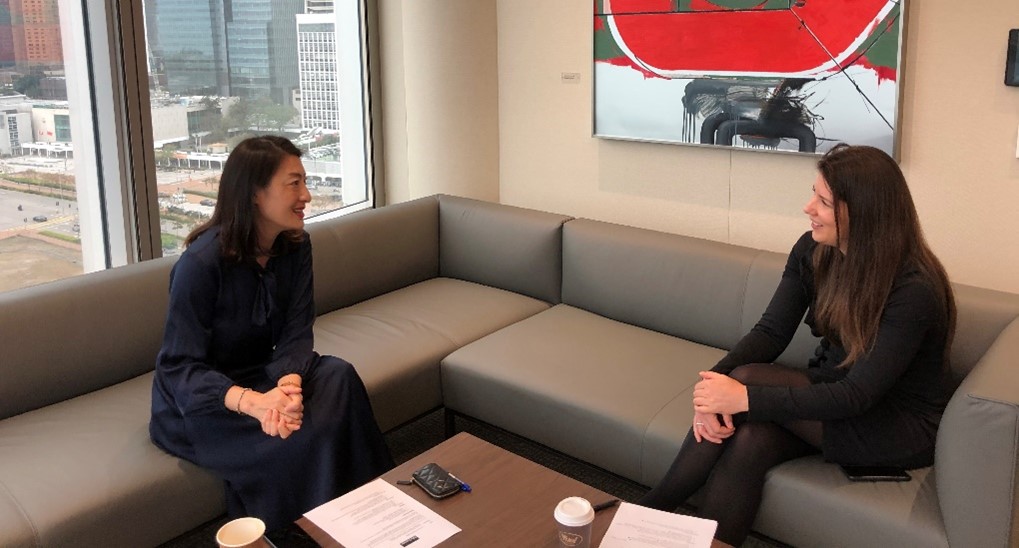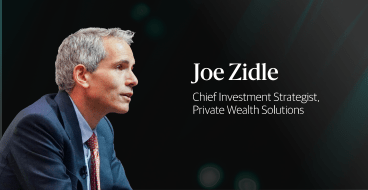Blackstone by Example: Carol Kim and Tamzin Cubells
Our mentorship series features conversations between mentors and mentees across Blackstone to shed light on how we’re building the firm’s next generation of leaders. During National Mentoring Month, we are particularly excited to dive into how mentorship can be vital to both the mentor and mentee.
In the latest installment, Carol Kim, Head of the Institutional Client Solutions Group in Asia, sat down with her mentee, Tamzin Cubells, Senior Vice President in Human Resources. They discuss jumping into new roles, learning how to delegate effectively and staying focused in the face of competing demands.
Since joining Blackstone in 2008, Carol has been involved with investor relations and new business development in Asia. Prior to Blackstone, Carol was Vice President in the Absolute Return Strategies Group at Lehman Brothers, Director of Marketing at Continuity Capital, LLC, as well as a Marketing Associate at P. Schoenfeld Asset Management.
Tamzin Cubells is a Senior Vice President of Human Resources, and is involved in the firm’s human resource management across Asia Pacific. Prior to joining Blackstone in 2016, Tamzin worked for BlackRock on the Asia Pacific Human Resources Business Partner Investments and Alternatives team, as well as previously worked for Nomura and GE, advising on talent management and leadership programs.

Tamzin Cubells: Carol, you’ve been in this industry for many years. What was the most unexpected part of your early career?
Carol Kim: Looking back, a game changer for me was the decision to buy a one-way ticket to Seoul for my first job after university, and begin to build an international career for myself. At the time, I said to myself, “What do I have to lose? Why not?” I think it’s great to take a chance like that early in your career. It seems like a big decision, but I wasn’t risking that much. And it was a big tipping point for me. I know you had a similar experience in your career.
TC: That’s right. My boyfriend, later husband, had a role that moved from London to Tokyo. He asked if I’d like to move with him. I’d only been in my job for just over a year. I had a great female manager who was also a great sponsor, and I told her, “I have a tough decision to make, but I really love working at this firm.” And she said, “Tamzin, I don’t want to lose you, but you should go and do this. And if in a year’s time it’s not the right role for you, then you can come back.” So I moved to Tokyo and enrolled myself in six months of Japanese classes.
CK: As you then started to advance your career, what did you find some of the challenges to be?
TC: As I’ve taken on management roles, delegation is something I continue to work on. It’s about getting the right balance across the team – making sure everyone’s got the right stretch, opportunities and engaging work, and that you’re fair in how you approach different topics.
CK: Delegation can be hard, especially when you’re shifting from a player to a player-coach role. I always hear people say, “It’s faster if I just do it myself.” I’m guilty of this too, but it catches up to you in a negative way. I have found that in the long run it is faster and more productive to delegate. You can accomplish more as an individual and as a team if you’re letting other people take on more. I’ve also found that really caring about the development of each individual on your team helps to naturally feed the delegation.
TC: I’ve watched you do that. In Monday meetings, it’s not always you who gives the updates. It’s people on your team.
CK: It’s also about having an open dialogue with your team and encouraging them to speak up. I’ve always believed that we all have something to learn from one another. And in mentor-mentee relationships, it’s not just one direction in terms of the information flow and the knowledge transfer.
TC: What were some of your biggest lessons learned as a mentee?
CK: If I think back to some of my missteps, I would attribute them to professional maturity. What helped me was having serious and supportive conversations with my manager, where they steered me back in the right direction. I’m really grateful for those situations and I think it’s important that we all go through that. Now when I see those situations with people earlier in their career, I pull them aside and have a supportive, constructive conversation to provide that guidance.
TC: I was very competitive when I was young – always asking how I could get to the next title. I remember my manager telling me, “Slow down. Don’t even worry about the title. These are the things you need to learn and the areas where you need to grow.” I now try to always adhere to that advice. It’s more important to focus on the role that you’re in, what you’re learning, and how you’re developing versus just worrying about the next level.
In your role now, how do you ask for feedback?
CK: I try to do my own homework and research first, and to have my own thoughts organized when I’m asking for feedback. It’s also been helpful to think of a possible solution for myself as opposed to just asking a very open question. If I’m more specific in my request initially, it shows that I’ve put more thought into it.
TC: That’s really helpful. And on top of managing all that you do at work, how do you make time for yourself and your family?
CK: I love doing what I’m doing, working with my team, with our clients, and learning about all the new products as Blackstone’s product offerings evolve. So, when I’m at work, I’m all in. And then on the weekends when it’s family time, I’m all in too, and I love it. For me, work-life balance is just about being in the moment.
TC: I’m trying to be a little bit more disciplined about that too. Back when I was traveling, I’d also make sure I got to Facetime home and speak to the children each day, and that makes a huge difference. One thing I have learned over the years is excessive multitasking doesn’t work. So, if I’m on a call and doing something at home, neither goes as smoothly as it could otherwise.
CK: I agree. If it’s work, focus on the work. If it’s home or something personal, really provide the attention needed. I’ve also found that multitasking is not a good use of time, because sometimes the e-mail I thought I was reading during that personal time, I wasn’t really paying attention to. So, I have to read it again, and that’s not efficient.
TC: I was making cupcakes recently for one of my children for school and trying to take a call at the same time, and the cupcakes were a disaster. I’m pretty sure I got egg on the phone.
CK: So then you have to make a new batch.
TC: I did!
CK: Which ends up taking more time. Something small like that is great example of the bigger lessons you learn along the way in your career.



